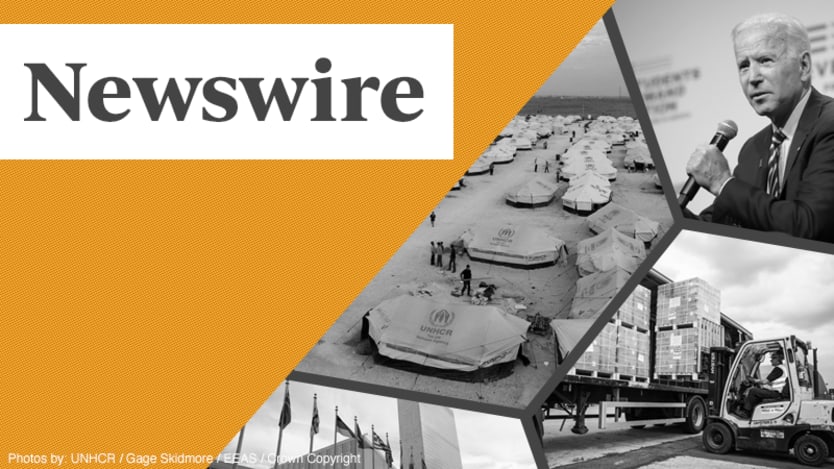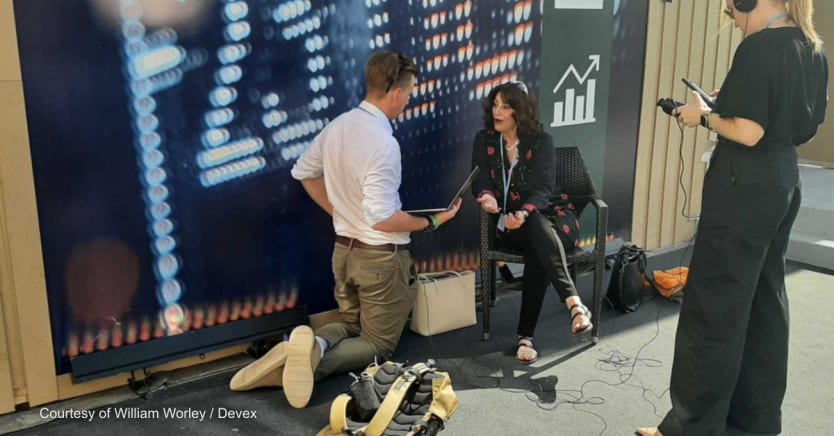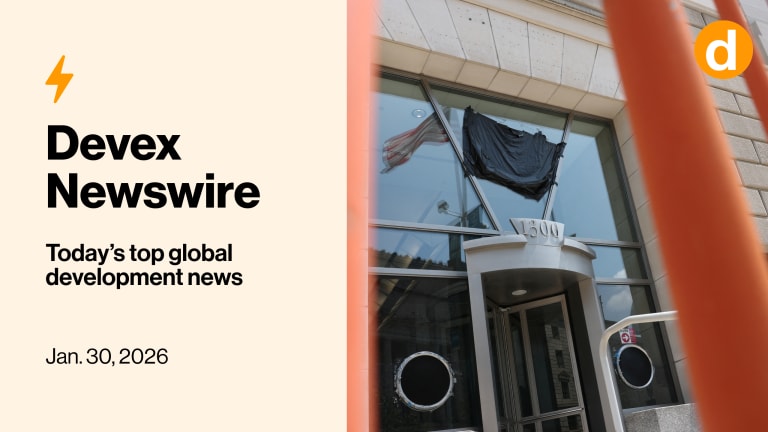Presented by Foundation for Partnership Initiatives in the Niger Delta

USAID global health contractors say they have been forced to quickly sign contracts that slash their benefits. It’s being billed as a way to reduce inequity within the global health bureau by standardizing benefits packages — but contractors aren’t buying it.
Also in today’s edition: Global leaders, NGOs, and climate activists are rubbing shoulders and butting heads under the same roof at COP 27 in Sharm el-Sheikh, Egypt. Devex is there reporting the tension and solutions. Plus, the push to reform multilateral lenders continues.
Backed into a corner
Contractors working for the U.S. Agency for International Development’s global health bureau are complaining that their jobs are being shifted from one contracting company to another, a move they say will mean significant cuts to their benefits.
This is a preview of Newswire
Sign up to this newsletter for an inside look at the biggest stories in global development, in your inbox daily.
The workers claim USAID leadership approved the changes without transparency, and they feel forced to accept the new terms or risk losing their contracts, reports my colleague Michael Igoe, who got access to a letter signed by hundreds of contractors.
In the memorandum to USAID Administrator Samantha Power and Assistant Administrator Atul Gawande, who leads the global health bureau, the contractors claim the situation “has had a negative impact on staff morale, motivation, and productivity – the opposite of the environment the Administration seeks to foster.”
Apparently, the new contracts include pay cuts, annual leave reductions, changes to paid sick leave and parental leave, and higher employee health insurance costs. Two current global health contractors tell Michael the change is being billed as an effort to bring greater equity to the bureau’s contractors by bringing more of them under the same employment arrangement.
“This is not what we were talking about when we said we wanted more equity in terms of contracts,” says one contractor.
Insiders say they have been given just days to sign new employment offers, an approach one contractor describes as “bullying.” A USAID spokesperson says the agency is not aware of any salary reductions, and the contracting company says it is providing contractors with more information to “better understand their total benefits and compensation package.”
Read more: Contractors say USAID is forcing them into new jobs with fewer benefits
MDB reform heats up
Pressure on multilateral lenders to overhaul their funding mechanisms and take on riskier bets — particularly for climate finance — is not letting up. And the United States has taken the lead.
U.S. Treasury Secretary Janet Yellen’s recent push for the World Bank to create a road map for reform was not just punchy rhetoric, according to Alexia Latortue, assistant secretary at the Treasury. Yellen wants it done as a priority by year-end so billions of dollars in loans can be unlocked for countries in need.
“The message was unequivocally clear that this is not a passing speech from the U.S., it was not passing commentary from some shareholders,” Latortue tells my colleague Shabtai Gold.
The U.S. is the largest shareholder in many prominent international lenders, so Yellen’s call for change is bound to be heard. Meanwhile, the banks hold the power to crowd in private capital, Latortue says, and private investors want to shift from fossil fuel investments. Further, the U.S. wants to create more “incentives” for countries to borrow for climate finance.
The World Bank’s imminent overhaul should give its chief, David Malpass, a handy way to deflect questions from climate activists calling for his ouster as they mill the halls at COP 27.
Read: Need for development banks’ reform is ‘unequivocally clear,’ according to Treasury (Pro)
ICYMI: Poverty reduction and climate change are 'the same breath,’ says Malpass
+ A Devex Pro subscription brings you essential analysis, data-driven funding insights, and access to the world’s largest global development job board. Get these perks and more by signing up to our 15-day free trial.
Mottley support for motley ideas
It seems not all African nations are on board with Barbados Prime Minister Mia Mottley’s Bridgetown Agenda. Some reckon it’s divisive.
Her ideas focus on middle-income countries — such as her birthplace. But the African continent has many much lower-income regions that the darling of COP 27 hasn’t courted for support, my colleague Sara Jerving heard on the ground in Sharm el-Sheikh.
While it’s true that lower-income nations have greater access to grant funding than bigger economies that must rely on loans, any likelihood of across-the-board, large-scale grant funding for climate is an “illusion,” a finance expert tells Sara.
It’s a tricky and political situation. A country such as South Africa, for example, won’t support an agenda that doesn’t include its neighbor Mozambique because they are strategic partners.
The continent doesn’t want to be divided, so Mottley must broaden her agenda if she wants the continent’s full support, the expert adds. But Mottley appears open to new ideas, so an expanded agenda is not out of the question.
ICYMI: Mia Mottley, the Caribbean queen of COP 27
+ Follow Sara, Rumbi Chakamba, and William Worley for updates as they report on the ground at Sharm el-Sheikh.
Access denied
Even before the 27th United Nations climate summit kicked off, human rights defenders raised concerns about the heavy-handed restrictions the Egyptian government had placed on civil society and free speech, citing numerous arrests and restrictions on protests. They called on the government to ease security measures — including spy cameras in taxis — and allow for free speech and assembly.
But it seems authorities didn’t get the message — or, more likely, ignored it. Participants with Observer Status badges — mainly civil society and activists — were barred from accessing the media center. Intimidating security guards, who my colleagues say don’t exactly ooze a protection vibe, stood at the doors to enforce the new rules. Our reporters were compelled to conduct interviews kneeling on the floor outside the center, which ironically has a designated interview room.

+ Join us — in person on Nov. 10 in Sharm el-Sheikh or online on Nov. 11 from anywhere — as we ask the tough questions on how climate disruption is changing the work, urgency, and challenges of achieving climate goals.
The cow and the buffalo
If there’s one constant at COP 27, it’s that governments, activists, corporates, and civil society all come together and tussle over how best to tackle the gravest of problems. It’s a ruckus of opinions. But one thing all nations — rich, poor, and everyone in between, agree on: The private sector must be part of the climate equation.
So, an event held at the African pavilion hosted by Botswana President Mokgweetsi Masisi brought together corporate players, NGOs, and government representatives to brainstorm how to build a climate-resilient Africa.
Masisi urged participants to rethink “woefully inadequate and ill-conceived” traditional financing mechanisms to tackle the climate crisis.
Zimbabwean President Emmerson Mnangagwa had an interesting way of framing the issue, according to Rumbi, who watched the event. He alluded to an old African proverb in his assessment of the current global structure and urged private sector partners to understand the African context to engage in meaningful partnerships based on equity.
“If you put a partnership between a cow and a buffalo, it is problematic. So it is necessary that the buffalo must know that it is in partnership with a cow, and the cow must know it is in partnership with the buffalo because the strengths are different,” he said.
In other words, communication and respect are key.
In other news
Schools in Uganda will close two weeks earlier than usual in an effort to stop the spread of the Ebola virus after eight children died and 23 cases among students were confirmed. [Al Jazeera]
Sri Lanka is facing severe food insecurity, with 3.4 million people in need of urgent humanitarian help, according to the U.N. [France 24]
World Bank President David Malpass announced a new financial instrument aimed at providing disaster risk finance and insurance to climate-vulnerable countries, with German Chancellor Olaf Scholz already pledging €170 million to the program. [Reuters]
Update, Nov. 9, 2022: This article has been updated to clarify that civil society and activists are barred from accessing the media center at COP 27.
Sign up to Newswire for an inside look at the biggest stories in global development.








